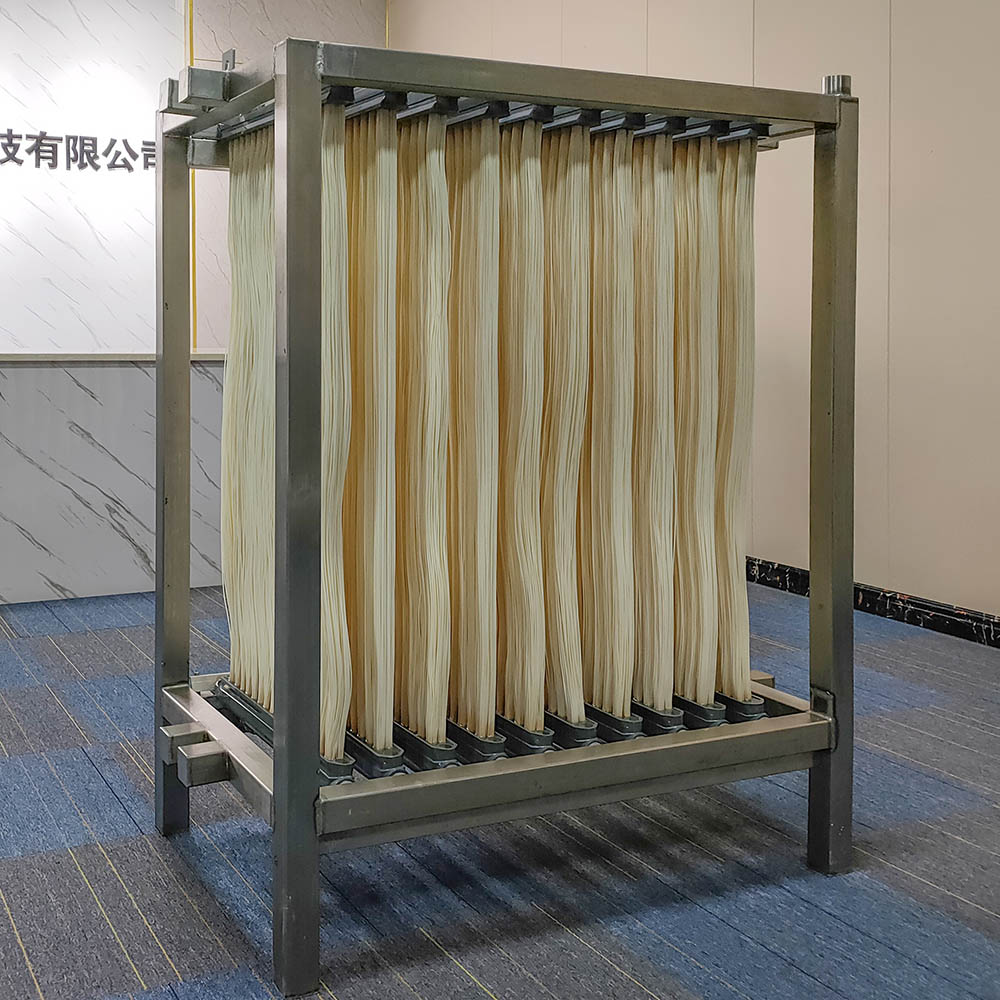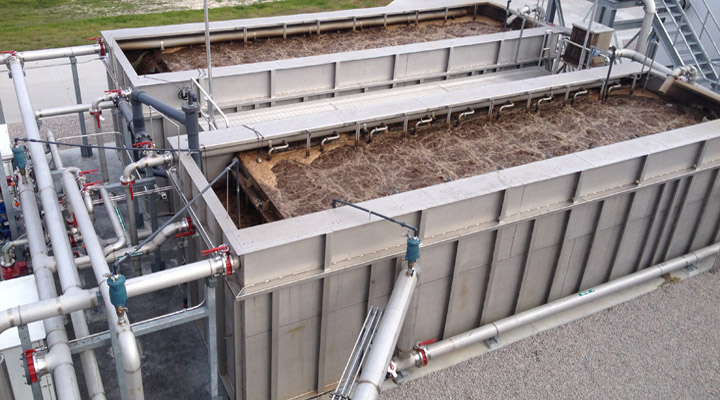Exactly How Membrane Layer Bioreactors Are Transforming Water Filtration Solutions
The emergence of membrane bioreactors (MBRs) stands for a significant improvement in the field of water purification, merging organic therapy processes with sophisticated membrane layer filtering modern technologies. This assimilation not just improves the top quality of dealt with effluent however also addresses metropolitan area constraints, making MBRs specifically ideal for largely inhabited locations. As global water scarcity magnifies, the function of MBRs in assisting in drinkable water reuse and lasting water monitoring ends up being increasingly vital. Yet, the ramifications of this innovation prolong beyond performance-- what opportunities and difficulties lie in advance for its extensive implementation?
Overview of Membrane Bioreactors
Membrane bioreactors (MBRs) represent a considerable development in water filtration innovation, as they combine biological therapy procedures with membrane filtration. This assimilation enhances the performance of wastewater therapy by using microbes to weaken natural toxins while simultaneously utilizing semi-permeable membrane layers to different cured water from suspended pathogens and solids.
The MBR system typically contains an organic reactor where the microbial populace metabolizes contaminants, complied with by a membrane purification system that keeps biomass and permits just clean water to travel through. This twin capability causes higher effluent high quality contrasted to traditional treatment methods. MBRs can be operated in both batch and continuous circulation settings, using versatility in design and application.
In Addition, MBRs are characterized by their compact footprint, making them appropriate for city settings with room restraints. Membrane Bioreactor. They likewise make it possible for the recuperation of water for reuse, therefore adding to water sustainability initiatives. While MBR innovation has actually obtained popularity in commercial and municipal applications, its operational intricacies and power demands necessitate mindful consideration throughout application. Overall, MBRs are at the leading edge of boosting water treatment performance and quality, showcasing the possibility for innovative services in environmental management.
Benefits of MBR Modern Technology
The combination of organic treatment with membrane layer filtering supplies countless advantages for water filtration processes. Among the key benefits of Membrane Bioreactor (MBR) technology is its capacity to successfully remove both inorganic and natural impurities, resulting in top notch effluent. The membrane layers serve as a physical obstacle, protecting against put on hold solids and microorganisms from travelling through, which enhances the general security and dependability of treated water.
Furthermore, MBR systems require a smaller footprint contrasted to traditional treatment approaches, allowing for more effective room usage. This small design is particularly useful in metropolitan settings where land is limited. MBRs likewise show operational adaptability, fitting varying influent qualities and flow rates without substantial efficiency degradation.
Additionally, the process offers enhanced nutrient removal capabilities, particularly for nitrogen and phosphorus, which are vital for avoiding eutrophication in obtaining waters. The reduced sludge manufacturing related to MBR modern technology additionally converts to decrease disposal prices, making it a cost-efficient option in the future - Membrane Bioreactor. In general, the advantages of MBR technology setting it as a leading selection for lasting and innovative water purification systems, addressing both environmental and economic issues
Applications in Water Filtration
Applications of Membrane Layer Bioreactor (MBR) technology in water filtration are impactful and varied, dealing with various therapy needs across several fields. MBRs efficiently integrate organic therapy procedures with membrane layer filtration, making them suitable for municipal wastewater treatment, commercial effluent monitoring, and also potable water reuse efforts.
In metropolitan setups, MBRs are significantly used click here now to enhance the quality of dealt with wastewater, allowing for compliance with strict discharge policies and helping with the recycling of water for watering and non-potable usages. Their compact style also makes them appropriate for metropolitan settings where room is limited.
Industrially, MBR technology is utilized to treat process water and wastewater, specifically in markets such as food and beverage, drugs, and textiles. By successfully getting rid of impurities and suspended solids, MBRs assist sectors decrease ecological impacts while recovering important resources from wastewater streams.
Additionally, MBRs are obtaining grip in decentralized water therapy applications, where small systems can be released in remote locations or establishing areas. This adaptability makes it possible for areas to accomplish sustainable water administration solutions, enhancing hop over to here access to clean water while lowering dependence on standard therapy approaches.
Study and Success Stories

In an additional example, a textile manufacturing center in Bangladesh adopted MBR innovation to resolve its wastewater challenges. The system decreased chemical oxygen need (COD) degrees from 1,200 mg/L to less than 100 mg/L, thus meeting regulatory standards and substantially reducing environmental influence.
The College of Cape Town's MBR installation has proven effective in treating greywater for non-potable reuse on university. This task not only conserves drinkable water but also offers as an educational design for lasting practices.
Moreover, a seafood processing plant in Norway used MBR modern technology to treat effluents having high levels of natural matter, attaining over 90% toxin elimination. These case studies underscore MBR technology's flexibility and its essential role in boosting water high quality throughout diverse applications.
Future of Water Treatment Solutions
As international water deficiency and air pollution obstacles magnify, cutting-edge water treatment services are coming to be progressively important to make sure lasting access to clean water. The future of water treatment depends on the integration of innovative innovations that improve the efficiency and performance of filtration processes. Membrane bioreactors (MBRs) go to the forefront of this advancement, integrating organic therapy with membrane layer filtration to produce premium effluent ideal for different applications.

Emerging trends such as source healing from wastewater, including nutrients and power, will even more change treatment centers right into environment-friendly centers. Developments in nanotechnology and membrane products assure enhanced efficiency and long life of filtration systems.

Verdict
In conclusion, membrane layer bioreactors represent a substantial innovation in water purification innovations, effectively combining biological treatment with sophisticated membrane layer filtration. The countless benefits, including enhanced effluent top quality and lowered spatial needs, make MBRs specifically suitable for metropolitan applications. Their duty in safe and clean water reuse and lasting water administration highlights their importance in dealing with worldwide water deficiency obstacles. Continued research study and advancement will certainly even more enhance the efficacy and fostering of MBR innovation, guaranteeing a durable future for water treatment services.
The emergence of membrane bioreactors (MBRs) stands for a considerable advancement in the field of water filtration, combining organic therapy procedures with sophisticated membrane layer purification technologies. As international water shortage escalates, the duty of MBRs in helping with safe and clean water reuse and lasting water monitoring becomes progressively vital. They additionally make it possible for the recovery of water for reuse, thus adding to water sustainability initiatives.As worldwide water scarcity and contamination difficulties intensify, innovative water therapy services are ending up being significantly crucial to guarantee lasting access to clean water. Their role in safe and clean water reuse and sustainable water administration highlights their importance in addressing worldwide water shortage challenges.